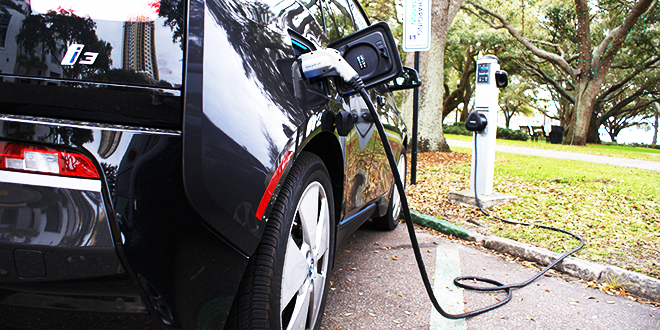Several US states impose a yearly fee on owners of electrified vehicles, and the state-level anti-EV movement is now shifting into high gear, with financial backing from oil industry groups.
As Gina Coplon-Newfield, Director of the Sierra Club’s Electric Vehicles Initiative and co-author Maggie Newshan write in a recent article, Wyoming, Colorado, Virginia, Nebraska, Missouri, Washington, North Carolina, Idaho, Georgia, and Michigan have all implemented yearly fees on electric and hybrid vehicles, ranging from $50 to $300 per year. Since the start of 2017, Indiana, South Carolina, Kansas, Tennessee, New Hampshire, and Montana have all introduced legislation that would implement similar fees. State DOTs in Arizona and Arkansas have also recommended new fees for EV ownership.
The experience of Georgia clearly illustrates the impact of state incentives (and/or disincentives) on EV sales and the local jobs they support. The Peach State used to offer a tax credit of up to $5,000 for EV purchases, and was second only to California in EV sales. In 2015, the state eliminated the incentive, and imposed a $200 yearly fee. EV sales have since fallen by 80 percent.
It’s no secret that the oil industry is mobilizing against electrification. In February 2016, the Huffington Post reported that a consortium that includes Koch Industries and other fossil fuel interests formed an advocacy group with a budget of $10 million per year to promote legacy fuels and attack government subsidies for EVs.
Boosters of EV fees argue that electrification is causing revenue from gas taxes, which is used to fund state road maintenance, to fall. However, this is a dubious argument for a couple of reasons.
First, EVs currently account for less than one percent of total US auto sales, so it’s likely that the increasing fuel efficiency of ICE vehicles accounts for most of the decrease in gas tax collections.
Second, as Ms. Coplon-Newfield writes, the gas tax was created in 1957, and hasn’t risen with inflation since 1993. Revenue currently covers only around 40 percent of maintenance costs – one reason for the widely-reported parlous state of the nation’s road infrastructure.
States are casting about for ways to make up the lost revenue. The options of going back to the gas-guzzling days of the 1950s or raising gas tax rates (!) are both obvious non-starters, so the gas tax, as currently implemented, is looking more and more like an outdated way to fund transportation infrastructure.
Some states have proposed more effective funding sources. Oregon has created OReGo, a road use fee based on miles traveled. Massachusetts and Illinois have also considered mileage-based tax programs, while Washington State has implemented a fee based on vehicle weight.
If you live in one of the states that are considering new EV fees, be sure to contact the Sierra Club for information and materials to help fight back.
Source: Sierra Club


















































































